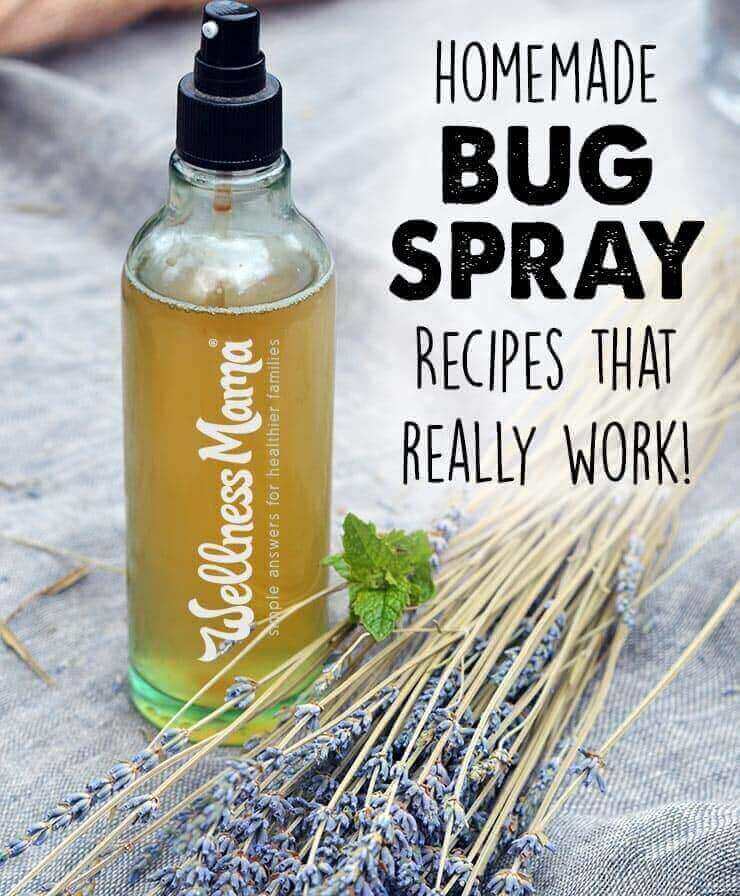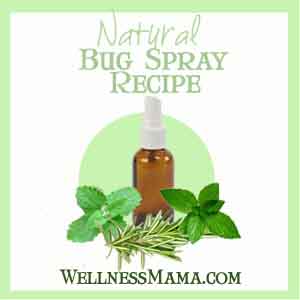

Every year as warmer weather approaches, I make several homemade products for summer including my homemade sunscreen and these homemade bug spray recipes.
I don’t actually use sunscreen often often because it limits Vitamin D production and I prefer to eat my sunscreen instead. This homemade bug spray recipe, on the other hand, unfortunately gets daily use where we live!
Why Homemade Bug Spray?
 At my house, we joke about mosquitoes being the size of birds, and they certainly do seem to come in flocks! Especially with small children who are prone to scratch mosquito bites, keeping them away is a priority.
At my house, we joke about mosquitoes being the size of birds, and they certainly do seem to come in flocks! Especially with small children who are prone to scratch mosquito bites, keeping them away is a priority.
Also a priority is avoiding chemicals like DEET, which are present in many commercial insect repellents. According to Green Your Body:
One of the most widely used ingredients in store-bought conventional bug sprays for personal use is N,N-Diethyl-m-toluamide, or DEET, as it’s commonly known. DEET, which is designed to repel, rather than kill, insects. DEET is used by an estimated one-third of the US population each year. Although DEET is approved by the US Environmental Protection Agency (EPA), it is a known eye irritant and can cause rashes, soreness, or blistering when applied to the skin. Additionally, DEET has been linked to neurological problems; according to the EPA, at least 18 different cases of children suffering adverse neurological effects, as well as the deaths of two adults, have been associated with DEET. Researchers at Duke University Medical Center have found that DEET causes diffuse brain cell death and behavioral changes in rats.
DEET has been shown to have a negative impact on wildlife and water sources in production and during use. DEET is toxic to birds and aquatic life. DEET has been found in approximately 75 percent of U.S. water sources, including the Mississippi River.
As with practically every household item, natural bug spray can be made inexpensively and naturally at home. (Some of our other favorites to make instead of buy are deodorant and toothpaste).
This recipe literally takes just seconds to mix up and can be varied based on what you have available. I’ve included several variations so you can try whichever one you have the ingredients for.
Essential Oil Bug Spray Recipe
This recipes uses essential oils, which are highly effective, but there are some concerns about putting these directly on the skin, especially on children. I prefer to use this recipe on clothing or gear instead of directly on the skin.
Homemade EO Bug Spray Ingredients
- Essential oils: choose from Citronella, Clove, Lemongrass, Rosemary, Tea Tree, Cajeput, Eucalyptus, Cedar, Catnip, Lavender, Mint
- Natural Witch Hazel
- Distilled or boiled Water
- Vegetable glycerin (optional)
Homemade Bug Spray Instructions
- Fill spray bottle (I used 8 ounce) 1/2 full with distilled or boiled water
- Add witch hazel to fill almost to the top
- Add 1/2 tsp vegetable glycerin if using
- Add 30-50 drops of essential oils to desired scent. The more oils you use, the stronger the spray will be. My personal favorite mix is: Rosemary, Clove, Cajeput, Lavender, Cinnamon and Eucalyptus… it works great and smells good too!
How to Make Bug Spray From Dried or Fresh Herbs
Fresh or Dried Herbs Bug Spray Ingredients
- Distilled water
- Witch hazel or rubbing alcohol
- Dried herbs: peppermint, spearmint, citronella, lemongrass, catnip, lavender, etc. I recommend using at least one herb from the mint family.
Fresh or Dried Herbs Bug Spray Instructions
- Boil 1 cup of water and add 3-4 TBSP of dried herbs total in any combination from the above. I use 1 TBSP each of peppermint, spearmint, catnip and lavender, and also throw in a couple of dried cloves.
- Mix well, cover and let cool (covering is important to keep the volatile oils in!)
- Strain herbs out and mix water with 1 cup of witch hazel or rubbing alcohol. Store in a spray bottle in a cool place (fridge is great because then its nice and cool!)
- Use as needed. Added bonus: it smells great and is very refreshing to the skin!
TIP: If you have the time and want to make a stronger version of this recipe, prepare the herbs in alcohol mixture as a tincture instead and use this directly as a spray after straining out the herbs.
Super Strong Insect Repellent Recipe
Fair warning: this stuff stinks when it is wet, though the smell disappears as it dries. It works incredibly well though, and this is the one I use when I’m going to be in the woods or in tick infested areas. It is based on a recipe that was supposedly used by thieves during the Black Plague to keep from getting sick. They used it internally and externally to avoid catching the disease and to keep the flies and other pests away. According to legend, it worked and they survived… but it definitely makes a great insect repellent these days! Its also very inexpensive to make and you probably already have the ingredients in your kitchen!
Vinegar of the Four Thieves Insect Repellent Ingredients
- 1 32 ounce bottle of Apple Cider Vinegar
- 2 TBSP each of dried Sage, Rosemary, Lavender, Thyme and Mint
- At least quart size glass jar with airtight lid
How to Make the Vinegar of the Four Thieves Insect Repellent
- Put the vinegar and dried herbs into large glass jar.
- Seal tightly and store on counter or place you will see it daily. Shake well each day for 2-3 weeks.
- After 2-3 weeks, strain the herbs out and store in spray bottles or tincture bottles, preferably in fridge.
- To use on skin, dilute to half with water in a spray bottle and use as needed.
- Use whenever you need serious bug control!
(Note: This mixture is very strong and has antiviral and antibacterial properties. It can also be used as a tincture for any illness. For adults, dose is 1 TBSP in water several times a day,for kids over 2, dose is 1 tsp in water several times a day. More on this in an upcoming post!)
Other Simple Insect Repelling Ideas
- Use a non-toxic, plastic-free insect-repelling band (I love this one), which is easier to use on children and very effective.
- Add vanilla extract to either of the above recipes, or just rub on the skin. You can also mix vanilla with witch hazel and water for a spray version.
- Plant insect repelling herbs in your yard. I grow lavender, thyme, mint and citronella near our patio and we use these fresh plants as bug repellent in a pinch.
- Rub lavender flowers or lavender oil on your skin, especially on hot parts of body (neck, underarms, behind ears, etc) to repel insects.
- Rub fresh or dried leaves of anything in the mint family all over skin to repel insects (peppermint, spearmint, catnip, pennyroyal, etc or citronella, lemongrass, etc) Basil is also said to repel mosquitoes and I’ve used fresh basil leaves in the garden with great success before!
Store Bought Natural Insect Repellent Options
There are now also some good natural insect repellent options available to purchase if you don’t have all of the ingredients on hand or want a simpler solution. Some of the ones that I have personally tried and liked are:
- Yellow Bird Insect Repellent (natural and made in the US)
- Babyganics natural insect repellent (listed as safe for use on children)
- Herbal Armor (allergy tested)
What are your tricks for keeping bugs at bay? Which do you think is worse… the insects or the chemicals in most repellents?
Continue Reading...All-Natural Homemade Bug Spray Recipes That Work!
from Blog – Wellness Mama http://wellnessmama.com/2565/homemade-bug-spray/?utm_source=rss&utm_medium=rss&utm_campaign=homemade-bug-spray
via SEO Derby
No comments:
Post a Comment